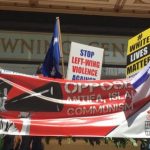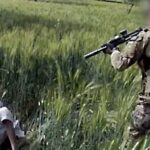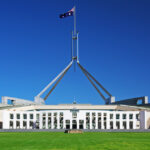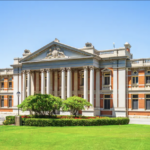Silencing Media Climate Coverage: DBH’s Jesse Noakes on the WA Police Grab for ABC Footage
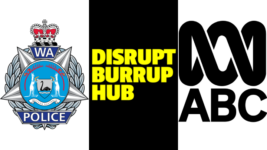
Disrupt Burrup Hub is a climate defence group that’s been campaigning in Western Australia over the last year, against the largest fossil fuel project on this continent, Woodside’s Burrup Hub, which, if it were a country, would be the seventh largest exporter of gas worldwide.
And in a similar manner to other law enforcement agencies across Australia, WA police has been excessive in its response to DBH’s disruptive yet peaceful protests, as multiple houses have been raided, charges carrying time have been laid, and a plainclothes officer pulled a gun on one activist.
The August morning after the gun was pulled, a small number of the DBH climate defenders attempted to perform a nonviolent, fairly lowkey, demonstration out the front of Woodside CEO Meg O’Neill’s house. But they were descended upon by WA police officers, who were lying in wait.
This protest hadn’t been announced, as DBH had kept what was involved in the action a secret, and this suggests that the WA police counterterrorism unit that’s been surveilling the group has done so in such an all-pervasive manner that they were aware of what was to happen that morning.
Indeed, the ABC Four Corner’s crew that was filming a documentary about WA police’s escalating approach to the policing of climate defenders and was present out the front of O’Neill’s house at that time, had no idea as to the details of the nonviolent direct action they were about to witness.
The documentary, Escalation, aired last Monday. But in the lead-up to its being broadcast, WA police demanded that the ABC hand over all the raw footage that it had taken of DBH in the making of the television program and there were suggestions the public broadcaster might comply with the order.
Questions remain, however, as to why WA police sought the footage, when its surveilling is resulting in officers being at the scene of unannounced protests prior to their taking place? And whether the police were after activists or were they trying to deter media from any such coverage in the future?
Sydney Criminal Lawyers spoke to Disrupt Burrup Hub media advisor Jesse Noakes about the loss of credibility the ABC would suffer if it does decide to hand over the footage it agreed it would keep to itself on multiple occasions and how escalation might be a good descriptor for the summer ahead.
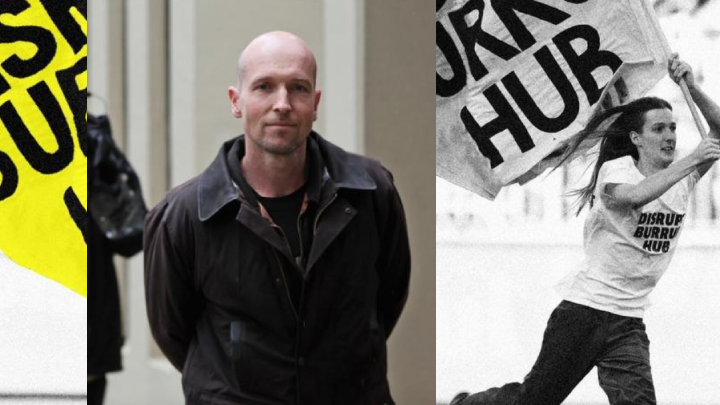
On Monday night, Four Corners screened Escalation: a documentary about the heightened WA police approach to climate defenders, which increasingly, both there and elsewhere, seems to frame these activists in a similar vein to organised criminals or terrorists.
The show incorporated Disrupt Burrup Hub members, including yourself, preparing for a nonviolent direct action that was planned in August to take place out the front of Woodside CEO Meg O’Neill’s house.
In the lead up to the show’s airing, WA police ordered the ABC to hand over all its raw footage that its journalists had captured of DBH in planning and discussions.
Civil society groups have spoken out against this threat to press freedoms. MEAA and its members have called on the ABC not to comply. And on Monday, during a conversation you had with Media Watch host Paul Barry, it came to light that the ABC seems to have decided not to comply.
Jesse, how should we perceive this move by WA police? Is it a threat against press freedoms or climate defenders or democracy? What’s your assessment of what’s at play here?
WA police are focused on targeting climate defenders. They just don’t care what happens to press freedoms along the way. It’s not a deliberate attempt to attack press freedoms by WA police.
But nor do they care about the integrity of journalistic ethics being preserved if it comes at the cost of their ongoing and escalating investigations into a fairly small group of climate activists in WA doing some pretty basic actions.
WA police seem intent upon devoting an inordinate amount of resources to policing in a fairly oppressive and over-the-top way.
The move definitely has implications for democracy and press freedoms, which is a case that I have made fairly vigorously.
But this is not about either of those from the WA police perspective. In order to continue targeting young climate campaigners standing up and fighting for their future, if they’re going to have to trample over some other significant considerations along the way, it’s just par for the course for them.
WA has always had a frontier mentality. It’s the wild west. And this is just the latest example, albeit one, as the name of the Four Corners program alluded to, of the authorities continuing to escalate the situation.
As Barry suggested during your interview, if WA police still wants that footage, they could apply for a warrant and raid the ABC studios to seize it.
However, since Monday, WA police has again been bargaining with the ABC over the footage, suggesting it would be happy to receive only some of it.
WA police officers were waiting for you on the morning of the action outside O’Neill’s house, which hadn’t been publicised. So, that means they’ve been surveilling your group in quite a pervasive manner.
So, why is WA police so concerned about this ABC footage, especially when they seem to have their tentacles prying into all corners of what DBH is up to already?
WA police have got ongoing investigations targeting Disrupt Burrup Hub. The State Security Investigation Group, the counterterrorism police, have been involved since February, leading the investigation and the policing of this campaign.
We know that there are some high-level decisions being made, and words like terrorism and extremism are certainly getting thrown around in parliament and in the press, if not, explicitly by the WA police themselves.
Although WA policing decisions are governed by considerations, such as whether a certain group sits within a terrorism framework or designation.
The Four Corners footage is just more of the ongoing attempt to prevent people from standing up and speaking out about Woodside’s Burrup Hub and what it is doing to this state, this country and our world.
For their part, the ABC needs to remember their charter and obligations. It is not just a media outlet but it’s the public broadcaster, which includes significant public interest stories and journalism that it will continue to seek to produce.
So, when it comes to questions about trust, undertakings and assurances that have been given and received, the ethical standard that is incumbent upon the ABC is even higher than it would be for a mere commercial outlet.
The idea that the ABC might surrender any part of this footage, despite negotiations and agreements with the Disrupt Burrup Hub campaign from the outset of this program’s production, is fairly unconscionable.
You’re soon appearing in court over having failed to comply with a data access order that WA police issued to you, under section 61 of the Criminal Investigation Act 2006 (WA).
This is a crime that carries prison time. And you’re not the first DBH member to be issued with one and not to comply with it.
In other jurisdictions, these types of orders have been applied as bail conditions. But in WA, they’ve been issued in cases where no criminal charges have been laid.
So, what’s the reasoning the authorities are using when issuing these orders? And how come DBH has taken this stance in refusing to comply with them?
As far as the reasoning of the authorities, it has been obscure and unstated. As you say, some people have been hit with these data access orders without being charged with anything.
And these orders carry the potential to be imprisoned for up to five years if no reasonable excuse is found not to comply with them.
At Joana Partyka’s trial last month, the court was informed by police under cross-examination that they had been conducting investigations into possible future offences, which is a fairly new concept entering the WA jurisdiction.
As for the position the campaign has taken in not complying with these orders, we simply feel it is unwarranted.
My view is that information, material and data that is on my devices goes back many years, and I have access to a wide range of material that has been provided by a wide range of sources in relation to many sensitive stories I’ve worked on over that period in my ongoing media roles.
This is not just in relation to climate, but also First Nations justice issues, housing and homelessness and the health system.
So, the idea that I would betray the people who have placed their trust in me and shared their stories by surrendering these sources to WA police, quite frankly, never crossed my mind, regardless of the potential penalty I could incur.
I’m consequently pretty startled that it appears that until fairly significant public pressure was applied to the ABC in recent days that management there had intended to comply and surrender all the footage to police, in spite of guarantees given to confidential sources.
The Disrupt Burrup Hub campaign’s position on this is the common sense one. It’s a show cause notice to police.
If they feel they have reasonable grounds to not just raid people’s homes but also to seize their personal communications devices and subsequently, return with orders that seek to compel people to give them access, then they need to put up some evidence first to explain, at the very least, what the basis for their demands are to have untrammelled access to surveil and monitor people’s not just actions and activities in the present day, but potentially communications going back years.
The police need to make the case. The burden of proof is on them to explain why on Earth, they are subjecting people to these fairly invasive and punitive policing measures. And until they do – and they haven’t so far – I certainly won’t be giving them access to anything of mine.
Commencing with NSW in April last year, a total of four states have enacted draconian laws relating to disruptive protests, directly in response to climate defenders.
However, WA has not followed suit. It’s taken a different approach involving multiple raids, intrusive surveillance and in one instance, a gun was pulled on one activist, who was seated in his car.
How would you describe what’s happening in WA? And why do you think law enforcement there is taking this somewhat different approach to other state police forces?
They appear to be unrivalled with the powers they possess in existing legislation, and these seem sufficient to enable them to enact substantial overreach on people engaging in peaceful protest without needing to enact further legislative measures.
Having said that, it wouldn’t surprise me in the least if new laws are on the cards. They may have been drawn up and kept ready to roll out at a moment’s notice when a certain threshold is reached. What that threshold might be, I’m not certain.
But certainly, the indications I have is that the WA government is not averse to legislating new police powers to protect fossil fuel interests in this state, specifically Woodside’s Burrup Hub megaproject.
But thus far, they seem to consider they have enough laws. WA is already a police state.
But the authoritarian slide in police practices may soon be met by the executive and legislative arms of government to further enable that level of repression against climate protest.
Of course, Disrupt Burrup Hub is attempting to see Woodside’s massive Burrup Hub installation in northern WA brought to an end. Recently, there’s been a victory via a court ordered injunction to halt seismic testing in the Scarborough region.
But the climate crisis is global. So, in your assessment, how far down the line are we in terms of the emergency across the planet? And how much time is there left to act?
Anyone who has been outside in recent weeks in Australia, or has got a social media feed, which have been full of floods across the planet in recent months, and then fires following behind them, or anyone who in one of those regions on the east coast of Australia, which have been hit by completely unseasonal fires as early as late September, in fact, anyone with senses to see which way the wind is blowing – which is straight towards us with smoke in the air – is aware that the situation is deteriorating even more rapidly than we’d anticipated.
We’re fast approaching a point of absolute no return and so, the need for climate action is more acute than ever before.
We are in for a long hot summer here in Australia, and by the end of it, there might be many more thousands of people taking similar actions to that which a group of young campaigners have been taking to disrupt Burrup Hub already this year.
The UN secretary general described this as entering a phase of global boiling, rather than global heating or warming.
The meteorological records that continue to get smashed day after day – the hottest day, the hottest week, the hottest month – seem to be reset more than one can keep up with. And this gives us an indication, at an abstract and analytical level, of the crisis we are in.
Many countries and places around the world in recent months have experienced very immediate, visceral and, in many cases, fatal incidents. And regrettably, I don’t think Australia is that far behind.
This summer is going to be a shocker. And by the end of it, all the police powers in the world aren’t going to stop many people standing up, taking action and speaking out to demand, force and compel their governments to take the necessary steps to avert as much of this crisis as we can.
And just lastly, Jesse, as the ABC program pointed out, the WA police counterterrorism unit has been focused on climate defenders for a number of years now, even before DBH formed.
The treatment of climate defenders as something akin to terrorists is not unique to WA in terms of the rest of Australia or indeed, across the globe. In the US, an activist attempting to defend an urban forest was recently shot multiple times by police.
If things don’t change in relation to the way that governments are approaching climate both domestically and internationally, what is to become of climate defenders in terms of their criminalisation and evolving tactics?
My view is that what we have experienced here in Western Australia over recent months and years, is only a small foretaste of what’s to come in the battle between people trying to prevent global apocalypse and governments, authorities and systems that seem intent on keeping us on a course towards complete catastrophe.
Other jurisdictions around the world are probably somewhat further along than us.
As you mentioned, there’s the shooting case in Atlanta recently, and there are people serving prison terms of multiple years in the UK for disruptive but entirely peaceful climate protest and other jurisdictions in Australia are experiencing crackdowns similar to what we are seeing here.
We just have to accept that the authorities are not going to go lightly into that good night, and nor must we.
If we thought saving the world from the end of the world was going to be easy, we’ve got another thing coming.
The powers that be are not going to let us lightly deliver the planet from the grip of the crisis we are in, and we have to be prepared for further confrontations and further invasive policing activity, further crackdowns from government and further protection of the most powerful vested fossil fuel interests in the world.
So, people just need to keep coming. Young people are standing up in greater numbers and with greater strength and staunchness than ever before.
You mentioned the treatment of the protester in the US recently, but more recently still thousands of young people took to the streets of New York, as part of the climate defence movement, demonstrating absolute staunchness in the face of some fairly terrifying policing tactics.
Here, in Western Australia, we recently saw a 19-year-old climate campaigner, a young woman, Matilda Lane-Rose stand up in the face of policing tactics, which has included a young campaigner being held at gunpoint at night.
Matilda has shown on Four Corners for all the country to see that she will not be intimidated, she would not be stood over or stood down.
And that’s a source of profound inspiration for many people and I expect to see many more young people standing up and joining the Matildas of this world and turning their minds, bodies and their spirits to the forces that are trying to take us down the path to complete catastrophe.
So, I don’t think things are going to cool down any time soon.


